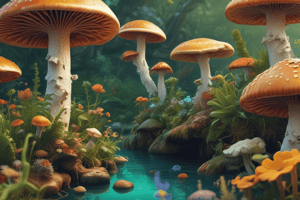Podcast
Questions and Answers
What is the role of producers in an ecosystem?
What is the role of producers in an ecosystem?
Producers, such as plants, perform photosynthesis and use light energy to make biological molecules.
What is the role of consumers in an ecosystem?
What is the role of consumers in an ecosystem?
Consumers, such as animals, cannot make their own biological molecules and need to eat plants or other animals to obtain biological molecules.
What is the role of decomposers in an ecosystem?
What is the role of decomposers in an ecosystem?
Decomposers, such as bacteria and fungi, perform saprobiotic decomposition by breaking down dead plants, dead animals, and animal waste to obtain biological molecules.
Why do producers need biological molecules and what are some examples of how they use them?
Why do producers need biological molecules and what are some examples of how they use them?
Why do consumers need biological molecules and how do they use them?
Why do consumers need biological molecules and how do they use them?
How do organisms carry energy and what are the main sources of energy for organisms?
How do organisms carry energy and what are the main sources of energy for organisms?
Flashcards are hidden until you start studying
Study Notes
Producers in Ecosystems
- Produce their own food through photosynthesis, converting light energy into chemical energy
- Use biological molecules such as glucose as energy and building blocks to synthesize other molecules
Consumers in Ecosystems
- Obtain energy by consuming other organisms or organic matter
- Need biological molecules as energy sources and building blocks for growth and maintenance
- Consumers can be herbivores (plant-eaters), carnivores (meat-eaters), or omnivores (both)
Decomposers in Ecosystems
- Break down dead organic matter into simpler substances, releasing nutrients back into the environment
- Play a crucial role in recycling nutrients, allowing them to be reused by producers
Energy and Organisms
- Organisms carry energy in the form of ATP (adenosine triphosphate), which is produced through cellular respiration
- Main sources of energy for organisms include sunlight, glucose, and other organic molecules
- Energy is passed from one organism to another through food webs and food chains
Studying That Suits You
Use AI to generate personalized quizzes and flashcards to suit your learning preferences.




